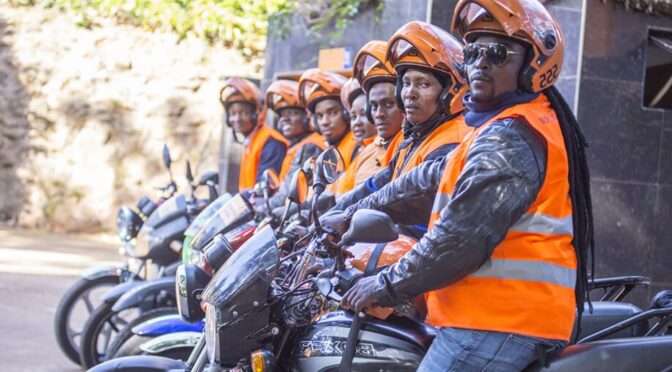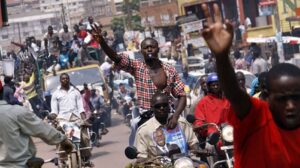Mobilities and community organizing amongst Boda-bodas riders in Kampala, Uganda
By Daniel Moriarty
Introduction
Waiting for an Uber on the corner of a busy intersection in Kampala, I realized that the dense city traffic was going to make me late for a critical interview as part of my research. Rather than continue waiting, I made eye contact with one of several approaching motorcycle taxis (called Boda-bodas or simply bodas) and stepped to the corner to hop on. Within a second, we were back in the sea of vehicles, racing past the standstill of cars and trucks in an assemblage of fellow bodas. Telling the driver my destination, the headquarters of the main opposition party, my heart began to race as I wondered whether the political allegiance of the “boda rider” would prevent me from reaching my interview. As it turned out, the rider was ecstatic in his support for the opposition, quickly weaving through Kampala’s labyrinth of streets to safely deliver me. While this encounter ended positively, my hesitancy was not entirely without merit; given their unique ability to move through city traffic, residents of Kampala are largely dependent on the boda riders and are often forced to place their complete trust in their driving ability and honesty, as high rates of injuries and robberies remain a problem.
Boda riders, numbering between 40,000 to 65,000 in Kampala alone (Goodfellow, 2016), play a vital role in the daily life of the Ugandan capital and their political influence have grown through their various formal and informal unions. While these unions have been targets of co-option by the ruling regime during times of political unrest, they have leveraged this influence to achieve collective goals (Goodfellow and Kristof, 2012). As Uganda continues to navigate a period of political strife between opposition parties and the regime, Boda riders provide transportation for thousands of Ugandans navigating Kampala and embody the informality of the city’s transportation sector through their incessant mobility.
Analysis
The importance of Boda riders reflects the critical role that informal transportation workers play in urban mobilities and illustrates how such an influential role can translate to political power across formal and informal spaces. To understand this, we should first consider the framework of mobilities research. As argued by Sheller and Orry (2006: 208), mobilities research seeks to address the gap left by social science that “has largely ignored or trivialised the importance of the systematic movements of people for work and family life, for leisure and pleasure, and for politics and protest.” Mobilities research, then, examines the ways in which quotidian movements of people and the networks these mobilities produce and affect the lives of those who occupy them. Likewise, Freudendal-Pedersen and Kesselring (2021) contend that urban planning and related fields like geography must move beyond a static ontology, and instead consider the complex and mobile networks that connect people and places. Boda riders thus illustrate the mobility of informal networks in African cities captured in Simone’s (2004) concept of “people as infrastructure.” African cities, according to Simone (2004, 407), are “characterized by incessantly flexible, mobile, and provisional intersections of residents that operate without clearly delineated notions of how the city is to be inhabited and used.” The informal mobility described by Simone and others is encapsulated by the individual boda rider navigating through Kampala traffic, as well as the collective agency of boda unions and networks.
Goodfellow (2016: 217-218), a prolific scholar on boda-bodas’ role in reproducing urban informality, succinctly connects previous literature on mobilities research and urban informality to the case of Uganda’s boda riders, arguing that it “is not always helpful to think of informal actors as entirely powerless…informal actors can be more or less effective in their attempts to negotiate their position relative to government… In Kampala, the growth of a class of informal transport workers…has to be seen in terms of both how government figures pursue gains in the sector and from how the transport workers themselves act to maintain their status as ‘untouchables.’”
Goodfellow thus highlights how boda riders exercise their own informal influence on Ugandan politics. The central role that boda riders play in the daily life of the city has cemented their status as valuable allies to longtime ruler Yoweri Museveni, whose personal favors for boda unions (such as preventing a boda tax from being implemented) have undermined efforts by Kampala city government to formalize and regulate the industry (Goodfellow, 2015; Courtright, 2022). As a result, boda unions have grown to be one of the most influential power blocs in Kampala (and, by extension, Ugandan) politics.
The influence exerted by boda unions thus complicates Simone’s idea of “people as infrastructure” where people navigate the city “without clearly delineated notions of how the city is to be inhabited and used” (Simone, 2004: 407). Instead, the case of the boda riders illustrates the power of mobile bodies and technologies to challenge the duality of informal and formal communities and exert political influence, thus contributing to the everyday production of urban spaces (Roy, 2005).
Implications
Informal transportation workers and their unions and networks are vital to the daily social and economic life of major cities across the Global South. Motorcycles, minibuses, tuk-tuks, and other forms of taxis have filled a critical gap in mobility caused in part by unchecked neoliberal development and the associated gridlock traffic. In the Global North, one can also see the emergence of “gig economy” mobilities options like Uber or other ride-share programs to supplement publicly funded transportation services. Understanding the often-overlooked people who work in these transportation spaces raises new questions in mobilities research and opens the door for discussion on how such sectors represent “essential work,” which in turn is inspiring recent efforts to study and formalize the bodaboda sector (Mukwaya et al., 2022).
The political influence of Kampala’s boda rider unions coupled with the co-option of riders or other transportation workers by the state also highlights a critical area of research for scholars in and out of planning. As social movements practice varying tactics of resistance to contend with adversarial regimes, leveraging the influential role played by transportation workers can produce significant political impact. While social movements often practice tactics of occupation as a means of creating new spaces of expression and incurring economic costs to adversaries, mobilizing the drivers and workers who move through such spaces can also constitute a powerful counterhegemonic force. For example, the 2022 “Freedom Convoy,” a protest of Canadian truck drivers over COVID-19 vaccination requirements, saw hundreds of tractor-trailer trucks occupying and effectively shutting down parts of the Canadian capital of Ottawa (Yousif, 2022). The occupation of parts of the city not only served as a challenge to the Canadian government, but the protest also removed thousands of transportation workers from the normal conduct of neoliberal economic activity, reiterating the “essential” role that such workers play. Canadian truckers and Ugandan boda riders both serve as examples of how influential transportation workers across formal and informal spaces can be during times of contentious politics.
Source: One of several Ugandan startups seeking to formalize bodabodas and increase customer (and driver) safety.
Source: Boda riders driving in a motorized supporter march during election season.
Source: A mix of SafeBoda and independent Boda riders bypassing heavy automotive traffic in Kampala.



